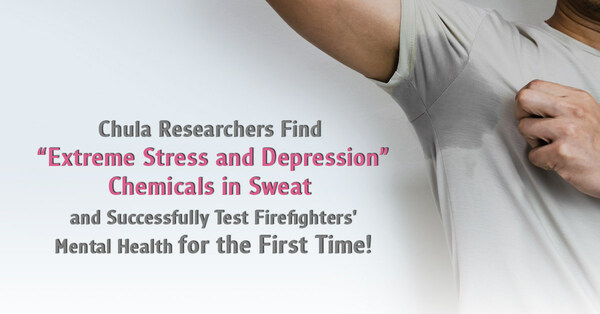BANGKOK, July 4, 2023 /PRNewswire/ -- Further to the success of the COVID-19 sweat test, Assistant Professor Dr. Chadin Kulsing, Department of Chemistry, Faculty of Science, in collaboration with Dr. Patthrarawalai Sirinara, MD, MPH Department of Preventive and Social Medicine, Faculty of Medicine, Chulalongkorn University have found the chemicals in sweat that can indicate stress and conducted a pilot study with over 1,000 firefighters from 47 fire stations around Bangkok yielding 90% accuracy.

Chula Researchers Find “Extreme Stress and Depression” Chemicals in Sweat and Successfully Test Firefighters' Mental Health for the First Time
Recent statistics from the Department of Mental Health showed that around 1.5 million Thais have mental health problems, 49.36% of whom have work-related stress and depression, especially those with high-risk occupations being responsible for public safety or having to make decisions under pressure, such as police, military, firefighters, etc.
"So, we tried to find an innovative, effective, and affordable way to screen for mental conditions before seeing a psychiatrist," said Asst. Prof. Dr. Chadin. He further detailed the process of collecting sweat samples, "We insert sterilized cotton swabs under the left and right armpits and leave them for 10-15 minutes. Then we put the sweat swabs in a sterile vial with a lid, and send the sample to the lab to be examined with an odor chemical analyzer. Air from within the sample vial will be injected into the machine and wait for the analyzer for 10-15 minutes. The results will be displayed in a fingerprint of the chemicals in each sample."
Professor Dr. Michael Maes, MD, Ph.D. Dr. Chavit Tunvirachaisakul, MD, Ph.D., Department of Psychiatry, Faculty of Medicine, Chulalongkorn University, and King Chulalongkorn Memorial Hospital, Thai Red Cross Society serve as research team to confirm the final results of the study.
"Participants will know their own results. In high-stress cases, they can see a psychiatrist at King Chulalongkorn Memorial Hospital right away. All test results and medical information will be kept confidential. The research team will not disclose information or notify the supervisor to give the patients peace of mind that the results may affect their work," said Dr. Patthrarawalai.
The research team plans to expand the stress screening to other high-risk, high stress occupations, particularly those involving public safety or gun violence, hoping that it will grant these personnel quick access to mental health screening, and timely treatment.
Read the full article at https://www.chula.ac.th/en/highlight/122925/
Media Contact:
Chula Communication Center
Email: Pataraporn.r@chula.ac.th










